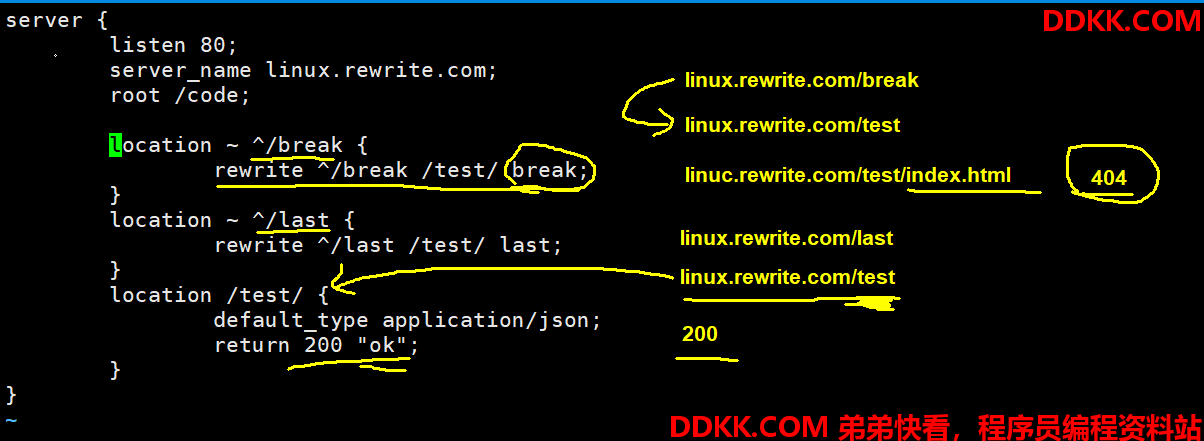一、Nginx Rewrite概述
现在Nginx已经成为很多公司作为前端反向代理服务器的首选,在实际工作中往往会到很多跳转(重写URL)的需求。比如更换域名后需要保持旧的域名能跳转到新的域名上、某网页发生改变需要跳转到新的页面、网站防盗链等等需求。如果在后端使用的Apache服务器,虽然也能做跳转,规则库也很强大,但是用Nginx跳转效率会更高。
Rewrite主要实现url地址重写,以及重定向,就是把传入web的请求重定向到其他url的过程。
二、Nginx Rewrite使用场景
1、地址跳转,用户访问www.baidu.com这个URL时,将其定向至一个新的域名mobile.baidu.com
2、协议跳转,用户通过http协议请求网站时,将其重新跳转至https协议方式
3、伪静态,将动态页面显示为静态页面方式的一种技术,便于搜索引擎的录入,同时建上动态URL地址对外暴露过多的参数,提升更高的安全性。
4、搜索引擎,SEO优化依赖于url路径,好记的url便于智齿搜索引擎录入
三、Nginx Rewrite跳转实现
Nginx是通过ngx_http_rewrite_module模块支持url重写、支持if条件判断,但不支持else。另外该模块需要 PCRE支持,应在编译Nginx时指定PCRE 支持,默认已经安装。根据相关变量重定向和选择不同的配置,从一个location跳转到另一个location,不过这样的循环最多可以执行10次,超过后Nginx将返回500错误。同时,重写模块包含set指令,来创建新的变量并设其值,这在有些情景下非常有用的,如记录条件标识、传递参数到其他location、记录做了什么等等。rewrite功能就是,使用Nginx提供的全局变量或自己设置的变量,结合正则表达式和标志位实现url重写以及重定向。

Nginx跳转需求的实现方式:
1.使用rewrite进行匹配跳转
2.使用if匹配全局变量后跳转
3.使用location匹配在跳转
四、Nginx Rewrite基本语法
Syntax: rewrite regex replacement [flag];
Default: —
Context: server, location, if
rewrite #调用模块
regex #请求的链接(可以使用正则表达式)
replacement #跳转的链接
[flag]; #rewrite支持的flag标记
#示例
server {
...
rewrite ^(/download/.*)/media/(.*)\..*$ $1/mp3/$2.mp3 last;
rewrite ^(/download/.*)/audio/(.*)\..*$ $1/mp3/$2.ra last;
...
}
五、Nginx Rewrite的flag标记
rewrite指令根据表达式来重定向URL,或者修改字符串,可以应用于server,location,if环境下,每行rewrite指令最后跟一个flag标记,支持的flag标记有如下表格所示:
| 标记 | 说明 |
|---|---|
| last | 相当于Apache的【L】标记,表示完成rewrite,本条规则匹配完成后,停止匹配,不再匹配后面的规则 |
| break | 本条规则匹配完成即终止,不在匹配后面的任何规则 |
| redirect | 返回302临时重定向,浏览器地址会显示跳转后的URL地址,爬虫不会更新url |
| permanent | 返回301永久重定向,浏览器地址栏会显示跳转后的URL地址,爬虫更新url |
六、last和break的区别
1.配置nginx
[root@web01 ~]# vim /etc/nginx/conf.d/linux.rewrite.com.conf
server {
listen 80;
server_name linux.rewrite.com;
root /code;
location ~ ^/break {
rewrite ^/break /test/ break;
}
location ~ ^/last {
rewrite ^/last /test/ last;
}
location /test/ {
default_type application/json;
return 200 "ok";
}
}
2.重启
[root@web01 ~]# nginx -t
[root@web01 ~]# systemctl restart nginx
3.配置hosts测试
10.0.0.7 linux.rewrite.com
#结果
1)访问 linux.rewrite.com/break,返回结果404
2)访问 linux.rewrite.com/last,返回结果ok
4.结论
break只要匹配到规则,则会去本地配置路径的目录中寻找请求的文件;
而last只要匹配到规则,会对其所在的server(...)标签重新发起请求。
break请求:
1)请求 linux.rewrite.com/break
2)匹配 location ~ ^/break 会跳转请求 到 linux.rewrite.com/test
3)请求跳转后,会去查找本地的站点目录下的 test/index.html;
4)如果找到了,则返回站点目录下的 test/index.html的内容;
5)如果没找到该目录则报错404,如果找到该目录没找到对应的文件则403
last请求:
1)请求 rewrite.drz.com/last
2)匹配 location ~ ^/last 会跳转请求 到 linux.rewrite.com/test
2)请求跳转后,会去查找本地的站点目录下的 test/index.html;
3)如果找到了,则返回站点目录下的 test/index.html的内容;
4)如果没找到,会对当前server重新的发起一次请求,linux.rewrite.com/test/
5)如果有location匹配上,则直接返回该location的内容。
4)如果也没有location匹配,再返回404;

七、redirect和permanent的区别
1.配置nginx
[root@web01 ~]# vim /etc/nginx/conf.d/linux.rw.com.conf
server {
listen 80;
server_name linux.rw.com;
root /code;
location /test {
rewrite ^(.*)$ https://www.baidu.com redirect;
rewrite ^(.*)$ https://www.baidu.com permanent;
return 301 https://www.baidu.com;
return 302 https://www.baidu.com;
}
}
2.配置hosts测试
#配置redirect时
关闭nginx之后访问失败
#配置permanent时
关闭nginx仍然访问成功
#结论:
redirect,每次访问服务器都会进行询问,是否进行跳转
permanent,记录一次跳转,以后都不会询问,直接跳转页面,除非清空缓存
八、Nginx Rewrite实践
1.案例一:用户访问/abc/1.html实际上真实访问的是/ccc/bbb/2.html
1.创建页面
[root@web01 ~]# mkdir /code/ccc/bbb/ -p
[root@web01 ~]# echo "/ccc/bbb/2.html" > /code/ccc/bbb/2.html
2.配置nginx
[root@web01 ~]# vim /etc/nginx/conf.d/rw.conf
server {
listen 80;
server_name nginx.rewrite.com;
root /code;
location ~* /abc {
rewrite ^(.*)$ /ccc/bbb/2.html redirect;
}
}
2.案例二:用户访问/2018/ccc/bbb/2.html实际上真实访问的是/2014/bbb/ccc/2.html
[root@web01 ~]# mkdir /code/2014/bbb/ccc/ -p
[root@web01 ~]# echo "/2014/bbb/ccc/2.html" > /code/2014/bbb/ccc/2.html
#配置nginx
[root@web01 ~]# vim /etc/nginx/conf.d/rw.conf
server {
listen 80;
server_name nginx.rewrite.com;
root /code;
location ~* ^/2018 {
rewrite ^/2018/(.*)/(.*)/(.*) /2014/$2/$1/$3 redirect;
}
}
3.案例三:用户访问course-11-22-33.html实际上真实访问的是/course/11/22/33/course_33.html
[root@web01 ~]# mkdir /code/course/11/22/33/ -p
[root@web01 ~]# echo "/course/11/22/33/course_33.html" >/code/course/11/22/33/course_33.html
#配置
[root@web01 ~]# vim /etc/nginx/conf.d/rw.conf
server {
listen 80;
server_name nginx.rewrite.com;
root /code;
location ~* ^/course {
灵活配法
rewrite ^/(.*)-(.*)-(.*)-(.*).html$ /$1/$2/$3/$4/$1_$4.html redirect;
固定配法
rewrite ^/course-(.*) /course/11/22/33/course_33.html redirect;
}
}
4.案例四:将http请求跳转到https
#Nginx跳转配置
server {
listen 80;
server_name www.baidu.com;
rewrite ^(.*) https://$server_name$1 redirect;
return 302 https://$server_name$request_uri;
}
server {
listen 443;
server_name www.baidu.com;
ssl on;
}
浏览器输入:baidu.com
浏览器转换:http://www.baidu.com/index.html
server层转换,rewrite跳转:https://www.baidu.com/index.html
九、Nginx Rewrite实现伪静态
1.创建站点目录
[root@web01 /code]# mkdir discuz
[root@web01 /code]# unzip Discuz_X3.3_SC_GBK.zip -d /code/discuz/
#授权
[root@web01 /code]# chown -R www.www /code/discuz/
2.配置nginx配置文件
[root@web01 /code]# vim /etc/nginx/conf.d/linux.discuz.com.conf
server {
listen 80;
server_name linux.discuz.com;
root /code/discuz/upload;
location / {
index index.php index.html;
}
location ~ \.php$ {
fastcgi_pass 127.0.0.1:9000;
fastcgi_param SCRIPT_FILENAME $document_root$fastcgi_script_name;
include fastcgi_params;
}
}
3.重启访问
[root@web01 /code]# nginx -t
[root@web01 /code]# systemctl restart nginx
#配置hosts
10.0.0.7 nginx.rewrite.com linux.discuz.com
4.创建数据库
[root@db01 ~]# mysql -uroot -pLinhd@123
MariaDB [(none)]> create database discuz;
Query OK, 1 row affected (0.00 sec)
MariaDB [(none)]> grant all on discuz.* to discuz@'172.16.1.%' identified by '123456';
Query OK, 0 rows affected (0.01 sec)
5.配置伪静态
[root@web01 /code]# cat /etc/nginx/conf.d/linux.discuz.com.conf
server {
listen 80;
server_name linux.discuz.com;
root /code/discuz/upload;
location / {
index index.php index.html;
}
rewrite ^([^\.]*)/topic-(.+)\.html$ $1/portal.php?mod=topic&topic=$2 last;
rewrite ^([^\.]*)/article-([0-9]+)-([0-9]+)\.html$ $1/portal.php?mod=view&aid=$2&page=$3 last;
rewrite ^([^\.]*)/forum-(\w+)-([0-9]+)\.html$ $1/forum.php?mod=forumdisplay&fid=$2&page=$3 last;
rewrite ^([^\.]*)/thread-([0-9]+)-([0-9]+)-([0-9]+)\.html$ $1/forum.php?mod=viewthread&tid=$2&extra=page%3D$4&page=$3 last;
rewrite ^([^\.]*)/group-([0-9]+)-([0-9]+)\.html$ $1/forum.php?mod=group&fid=$2&page=$3 last;
rewrite ^([^\.]*)/space-(username|uid)-(.+)\.html$ $1/home.php?mod=space&$2=$3 last;
rewrite ^([^\.]*)/blog-([0-9]+)-([0-9]+)\.html$ $1/home.php?mod=space&uid=$2&do=blog&id=$3 last;
rewrite ^([^\.]*)/(fid|tid)-([0-9]+)\.html$ $1/archiver/index.php?action=$2&value=$3 last;
rewrite ^([^\.]*)/([a-z]+[a-z0-9_]*)-([a-z0-9_\-]+)\.html$ $1/plugin.php?id=$2:$3 last;
if (!-e $request_filename) {
return 404;
}
location ~ \.php$ {
fastcgi_pass 127.0.0.1:9000;
fastcgi_param SCRIPT_FILENAME $document_root$fastcgi_script_name;
include fastcgi_params;
}
}
rewrite ^([^\.]*)/forum-(\w+)-([0-9]+)\.html$ $1/forum.php?mod=forumdisplay&fid=$2&page=$3 last;
http://linux.discuz.com/forum-2-1.html
http://linux.discuz.com/forum.php?mod=forumdisplay&fid=2&page=1
if (!-e $request_filename) {
return 404;
}
#判断请求的内容是否存在
-e:文件或目录是否存在
-d:目录是否存在
-f:文件是否存在
-x:文件是否可执行
十、Nginx Rwrite匹配优先级
1.匹配优先级
1)先执行server层的rewrite
2)再根据location匹配优先级匹配
3)再执行location下的rewrite
4)最后再执行location下if配置的rewrite
2.配置
[root@web01 /code]# vim /etc/nginx/conf.d/youxianji.conf
server {
listen 80;
server_name linux.youxian.com;
location / {
rewrite (.*) http://www.jd.com;
}
location =/ {
rewrite (.*) http://www.taobao.com;
}
rewrite (.*) http://www.baidu.com;
}
十一、Nginx Rewrite环境变量
1.$server_name
$server_name #当前请求的域名
server {
listen 80;
server_name test.linux.com;
rewrite ^(.*)$ https://$server_name$1;
}
http://test.linux.com/1.html
https://test.linux.com/1.html
2.请求文件
$request_filename #请求的文件路径名(带网站的站点目录 /code/images/test.jpg)
$request_uri #当前请求的文件路径(不带网站的站点目录 /images/test.jpg)
#大多数用于http协议转https协议
server {
listen 80;
server_name test.linux.com;
root /code;
return 302 https://$server_name$request_uri;
}
URL: http://test.linux.com/images/test.jpg
URI: /images/test.jpg
3.$scheme
$scheme 用的协议,比如http或者https
4.$http_host
#很久之前的配置方法
server {
listen 80;
server_name www.baidu.com baidu.com;
if ($http_host = baidu.com){
rewrite (.*) http://www.baidu.com$1;
}
}
#推荐书写格式
server {
listen 80;
server_name baidu.com;
return 302 http://www.baidu.com$request_uri;
}
server {
listen 80;
server_name www.drz.com;
}
十二、Nginx Rewrite日志开启
#配置
[root@web01 /code]# vim /etc/nginx/nginx.conf
... ...
error_log /var/log/nginx/error.log notice;
... ...
http {
... ...
rewrite_log on;
... ...
}